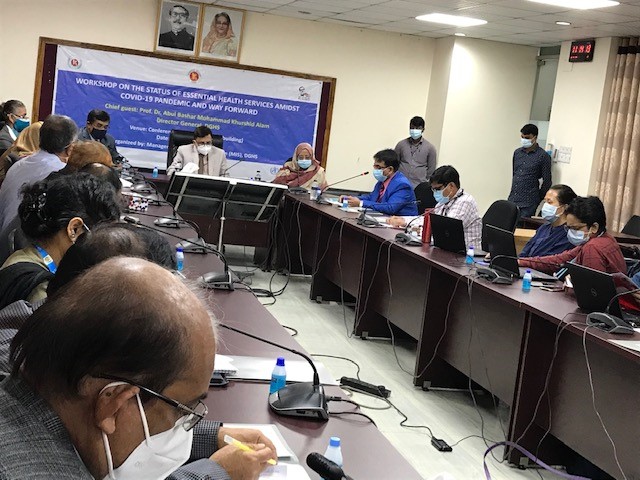Essential health services, heavily affected due to the COVID-19 pandemic, are gradually resumed all over the country, ensuring that people receive the needed healthcare.
Like in many countries around the world, the COVID-19 pandemic has caused an unprecedented impact on essential health services in Bangladesh, leading to a drastic reduction in utilization of the major essential health services across all levels of health systems during the period April to May 2020. This findings are based on the secondary analysis of routine health data from public health facilities in Bangladesh reported in the DHIS2 platform.
These reductions in service utilization were due to multiple factors such as the shortening of outpatient visiting hours, redistribution, re-assignment, and task shifting of frontline health workers towards COVID-19 pandemic response.
Among the most affected areas were essential maternal and newborn health services and supply chain of essential medicines for non-communicable diseases (NCD) like hypertension, diabetes, mental health, and other chronic diseases and cancers.
.jpg?Status=Master&sfvrsn=f28003d_9)
Essential service delivery. Photo by WHO Bangladesh/ Jubair Bin Iqbal
However, starting June, Bangladesh has gradually overcome the situation through the deployment of additional 2500 doctors and 5000 nurses, enhanced telemedicine services, and increased consultations for patients requiring routine and, emergency services. Additionally, health workers from COVID hospitals have been re-deployed to re-start the delivery of the essential health services to the full potential.
The information has been shared in a workshop on the maintenance of essential health services amidst Covid -19 pandemic, organized by Directorate General for Health Services (DGHS) and supported by WHO. The event, attended by health managers, aimed to assess the current situation of essential services delivery, challenges, and way forward.
“Essential services are a core part of health systems and is important to maintain their continuity as the coverage of essential services has a direct link to poor health outcomes if the service is missed or not provided. For example, disruptions in immunization services, even for a brief period results in increased numbers of susceptible individuals and an increased risk of outbreaks of vaccine-preventable diseases such as measles, polio, and diphtheria, leading to excess morbidity and mortality”, said Dr. Bhupinder Aulakh, WHO Deputy Country Representative to Bangladesh.

Workshop on Essential Health Services. Photo by WHO Bangladesh/ Dr Murad Sultan
While the restoration of essential health services began under the directives of DGHS, facilities were overwhelmed with increased pressure to deal with both COVID-19 and non-COVID-19 services.
On the demand side, the change in health-seeking behavior of communities triggered by travel restrictions, fear of getting the infection from health facilities, loss of routine earnings of vulnerable sections of society have also affected the utilization rate and access to routine health services.
Additionally, infections among frontline health workers have also contributed to the reduction in demand and in health systems capacity to deliver essential health services.
All divisional level health administrators prioritized the timely restoration of essential services by adopting innovative local level strategies such as regular monitoring of essential services delivery through physical visit and virtual meetings with the field health care providers. Further, they also maintained close collaboration with the higher authority in MOHFW and DGHS.
Besides strengthening health human resources, other measures to improve the access to essential health services and restore public confidence included logistic improvements such as re-arrangement of the patient beds, arrangement of dedicated ambulance for patients.
Additionally, increased monitoring activities have been conducted for routine immunization, family planning, outpatient consultancy, emergency management in community clinics and Upazila Health Complexes.
Furthermore, addressing the needs of health workers is a key area to strengthen essential health services. In this regard, recruitment of additional health workforce, motivational, psychosocial and mental support programs to frontline health workers, incentives for dedicated work, supportive supervision have been among the recommended measures to ensure that essential health services are provided.
WHO remains committed to supporting Government to restore and strengthen essential health services, an important pillar for achieving Universal Health Coverage.
